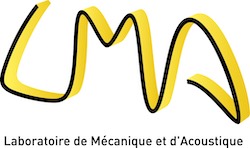In this talk, we are interested in a transmission problem between a dielectric (the vacuum) and a metamaterial. The question we consider is the following : does the limiting amplitude principle hold in such a medium ? This principle defines the stationary regime as the large time asymptotic behavior of a system subject to a periodic excitation. An answer is proposed here in the case of a two-layered medium composed of the vacuum and a particular metamaterial= (Drude model). In this context, we reformulate the time-dependent Maxwell’s equations as a Schrödinger equation and perform its complete spectral analysis [1]. This permits a quasi-explicit representation of the solution via the \generalized diagonalization" of the associated unbounded self-adjoint operator. As an application of this study, we show finally that the limiting amplitude principle holds [2] except for a particular frequency, called the critical frequency, characterized by a ratio of permittivities and permeabilities equal to -1 across the interface. This frequency is a resonance of the system and the response to this excitation blows up linearly in time.
References :
[1] M. Cassier, C. Hazard and P. Joly, Spectral theory for Maxwell’s equations
at the interface of a metamaterial. Part I : Generalized Fourier transform,
Communications in Partial Differential Equations (2017), 42 (11), 1707-1748.
[2] M. Cassier, C. Hazard and P. Joly, Spectral theory for Maxwell’s equations
at the interface of a metamaterial. Part II : Principles of limiting absorption
and limiting amplitude, in preparation.


